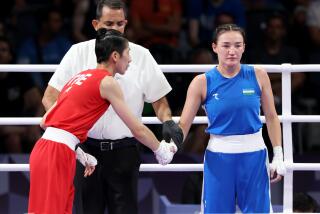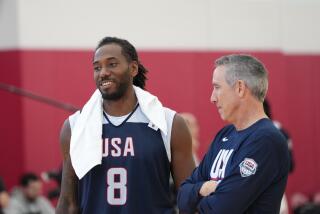Some icebreakers at the Olympics
No gold on the home turf
Canada has not won a gold medal in its two home Olympics -- summer and winter. To avoid a repeat of that, the Canadian Olympic Committee started a funding program called Own the Podium before the 2006 Winter Games, and it produced an all-time-best performance of seven golds, 10 silvers and seven bronzes. (The country was third in total medals behind Germany, 29, and the United States, 25.) Daniel Johnson, an associate professor of economics at Colorado College in Colorado Springs, is among those who predict that Canada will win more medals than any other country. Twenty-seven, to be exact, just edging the United States and Norway. Johnson claims an accuracy rate of 94% over the last five Olympics.
A swan song for the NHL?
Will this be the last time the NHL owners allow a two-week break so the best players in the world can compete? If so, what better place than Canada to go out with a bang, even though the tournament is being played on the smaller NHL-size surface for the first time. It’s all about economics and momentum. NHL Commissioner Gary Bettman foreshadowed the future of the NHL’s players in 2014 by telling reporters recently: “It’s difficult for any business, any league, to shut down for two weeks with the attendant loss of attention and everything that flows from that.” But the owners have the final say.
White just might be a lock
To the U.S. public at large, especially those under 25, snowboarder/skateboarder Shaun White is the only widely recognizable name in these Games. His flowing red hair adds to the celebrity the San Diego native has acquired on the professional circuit. You might also remember him from four years ago when he won the gold in the halfpipe competition at the Winter Olympics in Turin, Italy. He’s also had unprecedented success at the Winter X Games, with 10 gold medals since he first competed in 2003. Will he win again in Vancouver?
Hoping to spin a sixth medal
Apolo Anton Ohno became more famous for winning “Dancing With the Stars” in 2007 than he did for winning short-track medals (two gold, one silver, two bronze) in 2002 and 2006. With more folks knowing of him, can he win a sixth Olympic medal, or one more than Eric Heiden’s career record for a U.S. men’s skater (of course, his were all gold)? (Bonnie Blair has six). Outside of his trips to the Olympics, he has won the men’s national title 12 times. Ohno’s dancing partner was Julianne Hough, who parlayed her “DWTS” win into a country music career. Ohno’s country fame has nothing to do with music, unless you count the “The Star-Spangled Banner.” (Footnote: Snowboarder Louis Vito appeared on “DWTS” this season but fell short of the finals.)
It gets razor-thin on the ice
Will there be a repeat of the last North American Olympics, despite the new scoring system first used in figure skating at the 2006 Games? The focus this time will be on women’s singles, where supporters of Korea’s Yuna Kim and Japan’s Mao Asada, world champions in 2009 and 2008, respectively, each claim judges already have been unfairly downgrading their favorite. Under the “new” system, individual elements are first judged by a technical specialist, who determines the base value of an element. It’s then passed on to 12 judges, who rule on execution. Only the scores of nine of the judges, chosen randomly, count.
For U.S., a shot at some firsts
Team USA has a chance for its first medal in women’s luge (Erin Hamlin), its first medal in biathlon (Tim Burke), its first medal in women’s cross-country (Kikkan Randall) and its first bobsled gold since 1948 (Steve Holcomb in four-man). Hamlin won last year’s World Luge Championships, no doubt benefiting from the home-track advantage at Lake Placid. Last year, Burke became the first U.S. biathlete to lead the World Cup Championship. He finished second. Randall’s best was a 2007 World Cup bronze medal in the 1.2-kilometer sprint. Holcomb is coming off a season in which his sled won both the four-man and overall World Cup titles. Best bet: Holcomb.
She’s the queen of the hill
U.S. alpine skier Lindsey Vonn has utterly dominated the speed events (downhill and super-G) the last two years, winning 2009 world titles in both, and is favored to do that at the Games. Vonn has won everything but an Olympic medal in becoming the best female U.S. skier in history. Because she also has a good medal shot in alpine super combined and in slalom, NBC would be tempted to make her into a Michael Phelps-like miniseries. But, as Dick Ebersol told me, “One gust of wind can be the difference between gold and no medal. You don’t get a sudden tidal wave in one lane of a pool.”
A better Miller time this time?
Bode Miller went into the 2006 Olympics as the best men’s skier in the world but won nothing except the public’s disgust. Before the Games, he told about having skied drunk; later, after his medal shutout (a fifth, a sixth, two did-not-finishes and a disqualification for missing a gate), he said: “I got to party and socialize at an Olympic level.” After two seasons of paying his way around the World Cup circuit, Miller rejoined the U.S. Ski Team this year and has kept a relatively low profile, the only blip a sprained ankle playing volleyball. He has won one WC race this season and hopes to ski all five events, aiming for the only thing missing in his best-man-in-U.S. history resume: Olympic gold. (He won two silvers in 2002.)
Davis has stayed on track
Shani Davis was made the object of controversy for not skating team pursuit. He was blasted by teammate Chad Hedrick and hung out to dry by U.S. Speedskating, which never let the public know Davis had informed them he didn’t want to skate the event. Davis nevertheless won gold and silver medals, becoming the first black athlete to win a Winter Olympics gold in an individual event. Davis has dominated the 1,000 and 1,500 in the World Cup the last two years, setting records in both, and should win gold in at least one of the two.
It doesn’t feel like winter
It feels like spring in Vancouver, with temperatures in the high 40s. The forecast for the alpine areas in Whistler has rain in the next few days, then temps near 40s, which could mean fog or course conditions so poor there will be delays -- driving TV crazy -- and the ski wax technicians, not the skiers, will decide the outcome. Organizers were already trucking in snow to the freestyle/snowboard venue.
More to Read
Go beyond the scoreboard
Get the latest on L.A.'s teams in the daily Sports Report newsletter.
You may occasionally receive promotional content from the Los Angeles Times.





